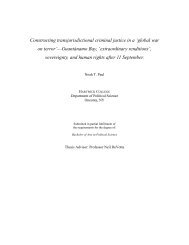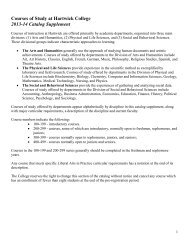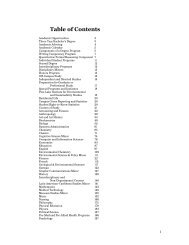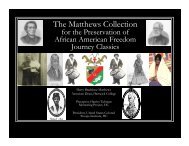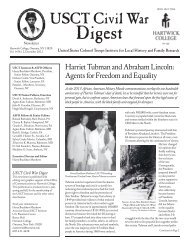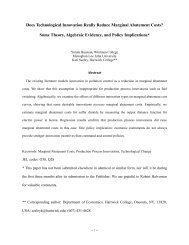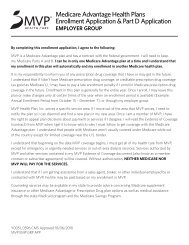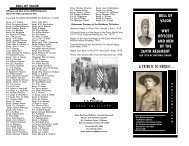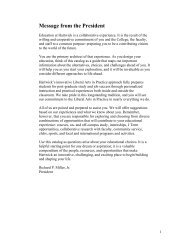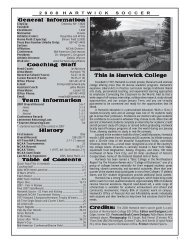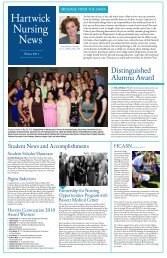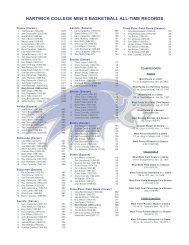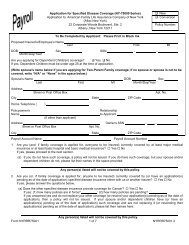Table of Contents - Hartwick College
Table of Contents - Hartwick College
Table of Contents - Hartwick College
Create successful ePaper yourself
Turn your PDF publications into a flip-book with our unique Google optimized e-Paper software.
organizations. Also required are three introductory courses concerning<br />
the vocabulary and structure <strong>of</strong> the business world, Econ 250-259 as well<br />
as Acco 141 and 142. It is recommended that these three courses be taken<br />
in the first and second years at <strong>Hartwick</strong>.<br />
In the junior year and senior year semesters students learn the following<br />
traditional management functions, using organizational behavior and<br />
accounting principles learned earlier: finance, human resources,<br />
international management, marketing, policy and strategy,<br />
entrepreneurship, and service organization operations. In addition,<br />
students will deal with leadership, team building and decision making;<br />
computer and information management issues; presentation and<br />
communication skills; and ethical dimensions <strong>of</strong> business situations.<br />
<strong>Hartwick</strong> <strong>of</strong>fers a dual degree program with Clarkson University and<br />
Union University, where students earn a B.A. from <strong>Hartwick</strong> and an<br />
M.B.A. or M.S. from Clarkson or Union.<br />
Faculty<br />
Thomas G. Sears, chair; John K. Clemens; Scott J. Dalrymple; Stephen A.<br />
Kolenda; Gregory J. Starheim; Priscilla Z. Wightman; Katrina A. Zalatan<br />
Courses<br />
261 Introduction to Business (4 credits) Analysis <strong>of</strong> behavior within<br />
the organization. Introduction to concepts <strong>of</strong> goal setting, structure and<br />
decision making. Examination <strong>of</strong> conflict, motivation, communication,<br />
team building and leadership theories. Organizational, interpersonal and<br />
personal dimensions <strong>of</strong> behavior will be examined through readings,<br />
cases, and running a small business in a simulated industry. No<br />
prerequisite. (SBA)<br />
340 Marketing (3 credits) Students assume the role <strong>of</strong> a product<br />
manager, responsible for marketing multiple products. Students learn<br />
and apply basic marketing principles and statistical, financial and<br />
economic analyses to design and market their products to meet customer<br />
needs and ultimately achieve target market share, revenue and pr<strong>of</strong>it<br />
objectives. Prerequisites: At least a C in Busa 261 and junior standing.<br />
341 Service Industries (3 credits) Students assume the role <strong>of</strong> general<br />
managers responsible for a company in a service industry. Students<br />
integrate basic finance, operations, human resource management and<br />
marketing concepts to achieve planned service delivery and pr<strong>of</strong>it<br />
objectives. Industry analysis, demand forecasting, capital budgeting, and<br />
strategic planning concepts also are emphasized. Prerequisite: At least a C<br />
in Busa 261 and junior standing.<br />
380 Finance (3 credits) Students assume the role <strong>of</strong> financial managers.<br />
Financing and investing activities are investigated with emphasis on<br />
learning the tools and techniques <strong>of</strong> this function. Building on the<br />
accounting and economics backgrounds <strong>of</strong> students, this course focuses<br />
on their properly making decisions based on quantitative analysis.<br />
Prerequisites: Busa 341 and Acco 142.<br />
381 Human Resources (3 credits) Students assume the role <strong>of</strong> human<br />
resource managers responsible for creating, implementing and critically<br />
69



